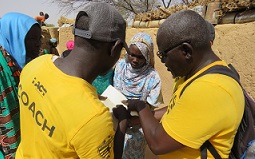Shaping the future: Our strategy for research and innovation in humanitarian response.

Shaping the future: Our strategy for research and innovation in humanitarian response.


iACT and Jesuit Refugee Service successfully completed the baseline survey assessments of children aged three to five attending the Little Ripples early childhood education programme. The Little Ripples programmes run in Darfuri refugee camps Kounoungou and Mile, in eastern Chad near the Chad-Sudan border.
We trained a team of four refugees to assist in facilitating the assessment process in each camp, and with translation during assessment interviews with each child and their caregivers. It took a total of 10 days to complete assessments with 90 children newly registering for Little Ripples, and 90 children who will not be attending or interacting with Little Ripples.
We used a survey that was slightly modified and had been improved since its previous use in 2016 with refugee children and caregivers living in Goz Amer, another Darfuri refugee camp, south of camps Kounoungou and Mile.
The Little Ripples assessment survey is composed of four questionnaires. The first questionnaire is administered to the caregiver and asks about characteristics of the family and household. Next, caregivers are asked a series of questions about each child eligible for, or registering at, Little Ripples.
When the caregiver questions are finished, the interviewer administers a short series of questions and exercises to the child. The child is asked questions that test basic cognitive milestones (colours, animals, counting, and alphabet) and social-emotional indicators. When the interviewer-administered questions are completed, the child undergoes anthropometric measurements and interviewers record basic physical health observations.
Preliminary results from our recent assessments indicate poor health conditions among the majority of children assessed, including a high prevalence of fever, cough, diarrhoea, and interviewer observations of discolored hair—a symptom of malnutrition. There is significant room for improvement across social-emotional and cognitive indicators. Children registering for Little Ripples in refugee camp Kounoungou were shown to have the lowest amount of “social activities” during their day, such as being read to, sung to, having stories told to them, and being taken outside of the home. As we further analyse the baseline results, we’ll have a more thorough picture of the status of the children surveyed in camps Kounougou and Mile and a solid baseline to measure the impact of Little Ripples for years to come.
Feature photo caption: Two refugee assessment team members conducting outreach for the assessment in camp Mile. Credit: iACT.


 Please upgrade your browser
Please upgrade your browser
You are seeing this because you are using a browser that is not supported. The Elrha website is built using modern technology and standards. We recommend upgrading your browser with one of the following to properly view our website:
Windows MacPlease note that this is not an exhaustive list of browsers. We also do not intend to recommend a particular manufacturer's browser over another's; only to suggest upgrading to a browser version that is compliant with current standards to give you the best and most secure browsing experience.